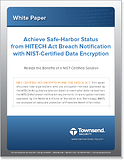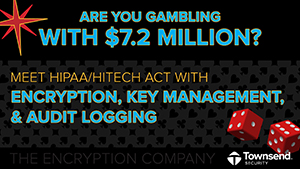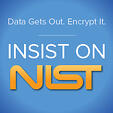 Townsend Security recently hosted a webinar titled “Protecting PHI and Managing Risk – HIPAA/HITECH Compliance” that focused on how members of the healthcare industry can achieve a breach notification safe harbor if they are properly encrypting their Protected Health Information (PHI). PHI can be stored in many different places – from Electronic Medical Records (EMR) in a database to healthcare claims stored on a laptop by a health insurance company. With fines for data breaches averaging into the millions of dollars, it is more important than ever to protect your PHI. We received some great questions during the webinar that we would like to share with our blog readers.
Townsend Security recently hosted a webinar titled “Protecting PHI and Managing Risk – HIPAA/HITECH Compliance” that focused on how members of the healthcare industry can achieve a breach notification safe harbor if they are properly encrypting their Protected Health Information (PHI). PHI can be stored in many different places – from Electronic Medical Records (EMR) in a database to healthcare claims stored on a laptop by a health insurance company. With fines for data breaches averaging into the millions of dollars, it is more important than ever to protect your PHI. We received some great questions during the webinar that we would like to share with our blog readers.
How is encryption used to protect PHI?
Encryption solutions are used in a variety of places. Basically those of us that are encryption vendors tend to think of encryption in two ways. The first is encryption of data in motion. For example, if you open a web browser and go to a website that uses HTTPS and the “lock” comes on, you are encrypting your data as it is “in motion.” Typically, SSL or TLS encryption is being used. These technologies protect any information that flows between your web browser and that endpoint – making it safe to send PHI like a social security number or medical records online.
Second, we think about securing data at rest. This typically means data that is in a database. When you go to the doctor and he interviews you and puts his results into the computer, that data is landing in a database and it needs to be protected. AES encryption and proper key management are necessary to protect this data.
Our database software has encryption options. Why would we need a third party software?
Lets start with an example. Encryption is part of the package when you purchase Microsoft SQL Server 2008 Enterprise Edition or Oracle 11g with Advanced Security. So you might say to yourself, “Why do I need something else if Microsoft offers encryption?” In these cases, you are sitting in a good place for the cryptographic portion, but still need encryption key management to meet any compliance regulation.
To line up with industry standards for encryption best practices, you need to have dual control and separation of duties. To do this you need to physically separate the encryption keys from where the protected data lives (Your SQL Server or Oracle database). It is great when a vendor provides encryption as part of their database software, but it only gets you halfway to where you need to be. An encryption key management Hardware Security Module (HSM) will bring you in line with best practices for dual control and separation of duties, allow you to pass your audit, and achieve safe harbor status in the event of a breach.
View our webcast “Protecting PHI and Managing Risk – HIPAA/HITECH Compliance” to learn how your organization can manage their risk of a data breach and achieve breach notification safe harbor status.


 The Health Insurance Portability and Accountability Act (HIPAA) of 1996 establishes and governs national standards for electronic health care transactions. According to the website of the U.S. Department of Health and Human Services:
The Health Insurance Portability and Accountability Act (HIPAA) of 1996 establishes and governs national standards for electronic health care transactions. According to the website of the U.S. Department of Health and Human Services:  A great example of an accidental data breach recently took place in South Carolina where a Medicaid employee transferred several spreadsheets of sensitive patient data to a personal email account. This kind of data breach could have exposed hundreds of thousands of patients to possible theft of Social Security numbers, Medicaid ID numbers, addresses, phone numbers, and birthdates.
A great example of an accidental data breach recently took place in South Carolina where a Medicaid employee transferred several spreadsheets of sensitive patient data to a personal email account. This kind of data breach could have exposed hundreds of thousands of patients to possible theft of Social Security numbers, Medicaid ID numbers, addresses, phone numbers, and birthdates.


 Many people we talk to are gambling with $7.2 million whether they realize it or not. This week we are at HIMSS12 in Las Vegas meeting members of the IT medical community – an appropriate venue for such high-stakes gambling. How are these people gambling with so much money? The average cost of a data breach is $214 per record, or $7.2 million for an organization. This figure is determined not only by direct costs of a data breach, such as notification and legal defense costs that impact the bottom line for companies, but also indirect costs like lost customer business due to abnormal churn.
Many people we talk to are gambling with $7.2 million whether they realize it or not. This week we are at HIMSS12 in Las Vegas meeting members of the IT medical community – an appropriate venue for such high-stakes gambling. How are these people gambling with so much money? The average cost of a data breach is $214 per record, or $7.2 million for an organization. This figure is determined not only by direct costs of a data breach, such as notification and legal defense costs that impact the bottom line for companies, but also indirect costs like lost customer business due to abnormal churn. If you aren’t familiar with NIST and FIPS 140-2 certifications, the National Institute of Standards and Technology (NIST) provides them to encryption and key management solutions after they undergo a rigorous testing process. The testing is carried out by independent testing labs who then report the results directly to NIST for validation. Only the most dedicated security vendors are able to pass the tests and achieve NIST and FIPS 140-2 certifications. Not only are these certifications essential for meeting compliance regulations, but they provide you an ease of mind that a third-party has verified the integrity of the product.
If you aren’t familiar with NIST and FIPS 140-2 certifications, the National Institute of Standards and Technology (NIST) provides them to encryption and key management solutions after they undergo a rigorous testing process. The testing is carried out by independent testing labs who then report the results directly to NIST for validation. Only the most dedicated security vendors are able to pass the tests and achieve NIST and FIPS 140-2 certifications. Not only are these certifications essential for meeting compliance regulations, but they provide you an ease of mind that a third-party has verified the integrity of the product.
